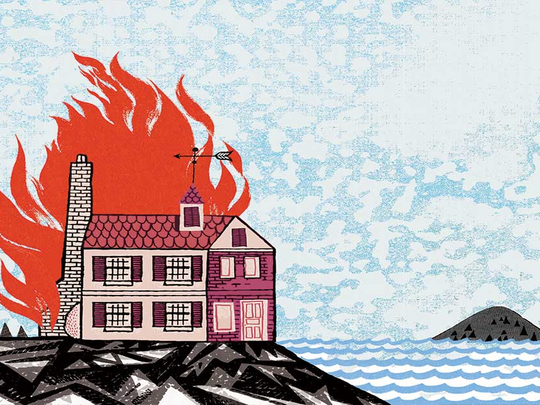
After the Fire
By Henning Mankell, Harvill Secker, 416 pages, £17.99
“No man is an island”, the poet John Donne announced. Muriel Spark played with this notion in her early novel, Robinson, where a human-shaped island begins to affect a group of castaways stranded there. Islands have a long association with literature, providing a setting for adventure, rebirth and danger. From Treasure Island to Lord of the Flies, they explore us as much as we explore them.
Henning Mankell, in his final novel, returns to the location of a previous book, Italian Shoes, and the same protagonist, retired orthopaedic surgeon Fredrik Welin. That earlier novel dealt with ageing and mortality, themes also central to this work. Welin lives alone on his small island off the coast of Sweden, his only regular visitor the postman Jansson. He is self-contained and introspective, but his world changes when his house burns down one night. Arson is suspected, and the police think him the likely culprit. Meanwhile he moves into a caravan and begins to become infatuated with a young journalist, Lisa Modin, who is interested in the story. His apparently feckless daughter Louise then arrives, their relationship fraught from the outset. She has plans to create a garden, an “ocean of emptiness”, but soon departs without explanation. Left alone again, Welin questions whether he has any future: “I felt as if I was walking through my house once more. The cumulative impressions left by several generations had been obliterated in just a few short hours ... Even things that are invisible can be reduced to soot and ashes.”
Soot and ashes, however, are soon joined by odd occurrences, their accumulation adding to a sense of dreamlike and dislocating foreboding. There are strange lights in the darkness, evidence of a shadowy visitor, a dead seal, a missing watch, a deceased local, and the continuing non-appearance of boots ordered from the harbour shop. Eventually a phone call sends Welin to Paris, where Louise is in trouble. He is followed there by the journalist — their odd-couple friendship reminiscent of the generation-defying one between Bill Murray and Scarlett Johansson in the film Lost in Translation — while the trip also finally leads to a deepening understanding between father and daughter.
Throughout, Welin finds that particular incidents or places take him back to moments in his life, adding an increasingly elegiac quality to the narrative. In one of these, he matter-of-factly relates the story of the time he sank his teeth into his mother’s leg, after hearing that his parents might wish to have a second child. These reminiscences show the reader that Welin is a complex and not altogether empathetic character. Having invited himself to Modin’s home, he pads around it in the middle of the night, opening drawers and a wardrobe, revealing secrets she would rather were kept hidden. He also peers through the caravan window as his daughter is getting dressed. Odd behaviours both: perhaps the reader is meant to wonder if Welin could be capable of arson, but this possibility is quashed when further fires break out elsewhere on the archipelago, one of them while Welin is in Paris.
Most of the mysteries are resolved in due course, while Welin himself finds peace (or perhaps just resignation): “I do not fear death. Death must be freedom from fear. The ultimate freedom.”
After the Fire, only now translated into English by Marlaine Delargy, was published in Sweden in 2015, the year Mankell died aged 67, after being diagnosed with cancer a year earlier. His international fame comes from his sequence of crime novels featuring Inspector Kurt Wallander, but he was also a dramatist, human rights campaigner and advocate for social justice. It is almost impossible for those acquainted with Mankell’s life and work to read After the Fire without wondering how much of the author there is in Welin and his musings. The book ebbs and flows through time, allowing its hero to examine his lived life as well as pondering what the future might hold. And yes, authors too can be voyeurs, peering through windows and padding across nighttime floors — how else do they garner characters and material?
This strange, beguiling book will sit as an oddity within Mankell’s oeuvre, yet it gives closure to a substantial career without becoming maudlin or overly bleak. The waters around Welin’s island may freeze in the winter, but there is human warmth to be found in these pages, along with glimmers of hope and consolation.
Donne would have it that we are all connected: “Every man is a piece of the continent ... I am involved in mankind”. This reflection is true both of After the Fire and its creator. The bell may have tolled for one of Scandinavia’s finest writers, but his connection to those left behind is unbroken. The stories remain, an archipelago of islands to be explored, and within them we will continue to see and learn about ourselves as well as others.
–Guardian News & Media Ltd
Ian Rankin’s latest novel is Rather Be the Devil (Orion).









